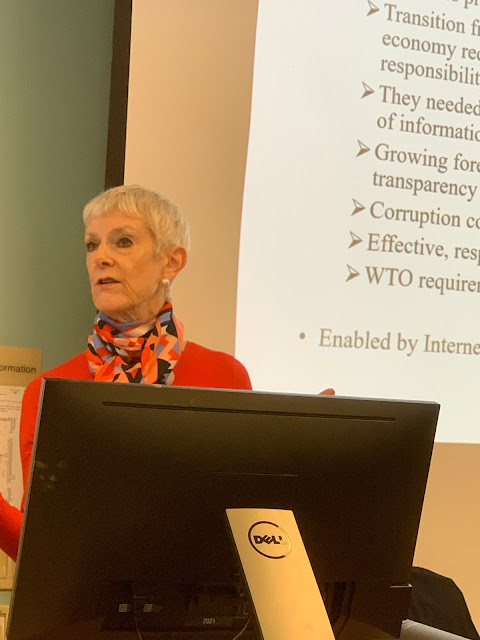I was delighted to participate in the quite enlightening Conference on Digital Platforms and Global Law organized by UNIDROIT, Roma Tre and the European Law Institute and held in Rome on 29 April 2022 (more on the Conference HERE). Special thanks to Fabio Bassan (Roma Tre) for making this possible. And in that context a strong plug for Fabio's very valuable new book--Digital Platforms and Global Law (E Elgar 2022). The Conference provided a quite valuable opportunity to consider the way that leading states and multilateral organs--the US, EU (and some of its key Member States)) and other state--have begun both to think about platforms and the possibilities and approaches to platform regulation (and tech management in general).
My presentation, Governing Platforms: Structural and Conceptual Challenges, is based on the play on words built into the first two words of its title. The presentation is offered as both a conceptual checklist for regulators for more effective production; and it is offered as well for those who are the objects of regulatory efforts (platforms and stakeholders), as a set of strategies for challenging, avoiding or resisting regulatory efforts by exposing them for what they are and for their deficiencies. In the process one considers the reasons that regulators can't help themselves but approach regulation in a specific way; and why the objects of regulation respond in kind--by co-opting, avoiding, internalizing, resisting or com modifying regulatory products within its more profoundly comprehensive systems for the production of objects and value. A fundamental problem for this object is language itself--an object and subject of comes next. So I will use images embedded in and alongside the text of my remarks. These images serve as a bridge, and as code. It may help get to the problem of coding of regulation in changing times in the sense that they translate words--the foundation of conventional regulation--into a language that is both rich and different, the interpretation and application of which may not align with text, or take text in very different directions.
To those ends, the presentation considered the issues of governing platforms through the perspective of first principles of regulation, of the ideologies of regulation, and of their application to emerging technologies with substantial potential for social, political, and economic transformation. These baseline or first principles tend to be overlooked in the rush to solve problems and to deploy power strategically in the protection of political and economic collectives by institutional actors with the power to act and their stakeholders. They include among them the problem of the sociological context in which the regulatory impulse operates: is it a reactionary turn in regulation (a problem in search of a solution in which tech is understood as a threat to orthodox regulatory ordering) or is it a solution in search of a problem (in which tech is understood s the future of regulatory transformation )? It also touches on ideologies that legitimate or privilege various forms of regulatory intervention: either post facto (Judicial or Private) or ex ante (Administrative and institutional). Moreover, platform governance strategies touch on fundamental ideologies of points or objectives of regulation: problem solving (ad hoc and anarchic--driven by recognition of dissonance or threat); system building (precautionary and intentional; orthodoxy and norms; absorption of emerging tech into existing systemic forms-objectives); instrumentalization of tech-based collectivism—use of tech to problem solve and system build; risk allocation (extending or re-thinking risk principles to tech); and accountability (absorbing tech into emerging regulatory cultures).
In the process, the presentation considered the key ways in which these first principles manifest themselves in platform regulatory impulses and trajectories. The first requires a consideration of platforms as object and as language. Platforms are a thing that can be assembled and disassembled and regulated in any aspect relating to the sum or its parts; but platforms are also systems that embody an ideology of architecture, of operation, and of the language used to make that operation possible, one to which traditional law forms are in compatible. The second requires consideration of platforms as emerging technologies of collectivism with its own architectures of regulation. Just as the technologies of ancient food markets in medieval Europe produced the architecture of the medieval city and the physical locations of economy, Church and state, so platforms provide a distinctive architecture with its own relations to politics and norms. The third requires a rethinking of the field of platform regulation as a unified space--platforms manifest in and as every sector of human collective activity, but in very different ways. Regulation that seeks to mold emerging platforms (tech based) on the basis of physically manifested platforms (a multinational enterprise for example) create dissonance and encourage resistance. The fourth touches on platform inter-connectivity. Here one speaks to vertical and horizontal connectivity in these senses:
•Platform integrity (based on type, function, and manifestation in physical-cyber space). The level of the single platform; operationalization and object integrity issues.
•Platform coordination (based on the needs and realities of inter-connectivity grounded in the processes of inputs and outputs). The level of coordination of related platforms along production chains; macro-economics or politics.
•Platform Oversight (e.g. smart cities; macro-economic policies; internationalization). The constitutional level of regulation—space where core principles are embedded.
•Platform as global disciplinary site (e.g. furthering rationalizing normative premises in cultures of compliance and accountability furthering normative principles of prevent-mitigate-remedy). The level of international/transnational hard and soft law; the focus on convergence around core rationalizing principles and language.
The fifth touches on the indivisibility of platforms, artificial intelligence, and machine learning. In effect, platform governance is undertaken in the shadow of a broader discussion of the role and placement of the human within human created systems in which the human creates but may not operate. If platforms can manage themselves, then the purpose of the law may be normative and accountability based but not capable or suitable to the regulation of standards or operations. The core normative issue here: to what extent are humans still at the center of the regulatory enterprise?; to what extent is it necessary to thing of the human person as a single data point? Or as singularly autonomous? And how does that transform regulatory core principles? That leads to the sixth theme--the core questions that ought to drive regulatory intervention:
•What is it that one is regulating (regulatory object)?
•Whose interests are to be protected?
•What are the objectives to which regulations are directed?
•Where is the regulation and regulatory power sited?
•To what extent are accountability and assessment measures effectively embedded, whether quantitative, qualitative or hybrid?
•To what ends do the regulations produce coherence with other regulatory measures and align with regulatory aims (data production, norm naturalization, compliance, social engineering, etc.)?
In the rush to find solutions, and to meet performance metrics (ironically enough), these tend to be the questions that slow the process and impede the use of law as a reactive gesture. And yet failure to work through these produces text without substance, or substance that works against reality--especially in tech related governance. And yet in the context of these questions arise the great ideological battles that shape the different approaches of the great regulatory sources (EU-US-China).
The seventh, then moves discussion from the "what" to the "who." It is here that one interfaces the old orthodox platforms that are traditional institutional bodies--international regulatory platforms, national regulatory platforms, platforms institutionalized as economic, social, or oversight platforms--with emerging digitalized platforms whose habits and language are quite distinct. Functional differentiation and capacity then suggest a division of labor that aligns with global trends toward the transformation of the state (and international bodies) into norm sources and accountability-compliance centers, towards the governmentalization of non-state collectives that serve as sites for the operationalization of objectives based rules, and the effective elimination of the autonomy of the human person who now serves as a vessel that is the responsibility of both. The eighth then, suggests a coordinated regulatory strategy based on notions of regulatory division of labor.
The ninth and tenth then move from the consideration of the manifestation of ideologies of regulation and regulatory orthodoxies when faced with the challenge of platforms and its transformation of the conceptualization of collective activity, to the fundamental conundrums that such movements suggests. The conundrums can be understood in three forms: (1) the object-subject of governance problem (do platforms govern or are governed?); (2) if current approaches are meant to take governance back, the question arising: back to what/who (the State; private organs; an administrative apparatus; markets; the 20th century; machines); and (3) where does the Human fit in (within the confines of platforms that take humanity from a ’HERE’ to a ‘THERE’ or otherwise). The presentation concludes at the broadest level, with a nod to the great background issue: Platforms and the End of the Anthropocene?
•(1) Platforms as heightened reality that de-centers the human and reorients the focus of the regulatory enterprise
•(2) Platforms and the disaggregation of the singular human person (humans now an aggregation of data or objects or behaviors, or components of larger systems)
•(3) If the human is de-centered, then the language of regulation—law as command directed to a wholly integrated human person—loses its power or relevance.
•(4) If the human is de-centered and the language of words with it, does this suggest the centering of numbers and logical symbols as the new effective language of law as a regulatory medium?
It is to be hoped that as both the great and small administrative institutions engage in the project of finding problems, and then proposing solutions, that they take a moment--if only a moment, to reflect on the larger questions that drive their project. The failure to embed these considerations will have a tendency to reduce regulators and the regulatory project, to a factor in the production of social relations that can, in turn, be easily managed by a conscious manipulation of the ideological space in which regulators operate. At that point the regulatory platform will become the superior problem in need of perhaps radical surgery.
The PowerPoint slides follow below and they may be ACCESSED HERE: Backer_GoverningPlatforms_UNIDROIT2022; these remarks may be accessed HERE.






















